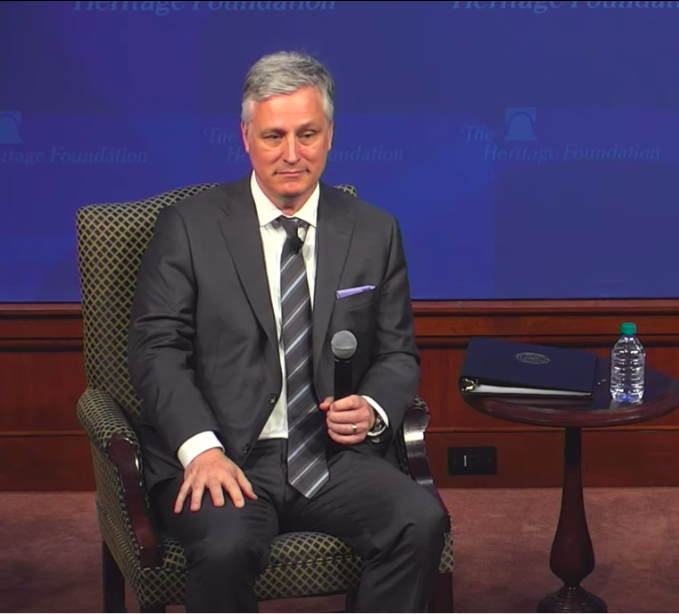
CalSTRS headquarters in West Sacramento, California.
CalSTRS’ Massive Investments in China but Disinvests From American Companies
California Teachers’ China Syndrome
By Lloyd Billingsley, November 25, 2019 2:20 am
The majority of American investors are unwittingly funding Chinese concentration camps, weapons systems for the People’s Liberation Army (PLA), and more.
Last year, the California State Teachers’ Retirement System, the largest educator-only pension fund in the world, disinvested from CoreCivic and the GEO Group, two publicly held American companies that operate private prisons. CalSTRS made the decision based on the Trump administration’s zero tolerance policy for border crossing that “led to the separation of children.”
In 2015, CalSTRS dropped Remington Outdoor, part of a campaign to disinvest from companies that manufacture firearms “illegal for sale in California.” In that cause, CalSTRS duly disinvested from Smith&Wesson and Sturm Ruger. Given that pattern, Californians might be surprised to learn that CalSTRS is one of the largest investors in Hikvision, based in Hangzhou, China, and the world’s largest supplier of video surveillance technology.
“Hikvision: US pension funds invest in China ‘big brother’ firm,” headlines a BBC story on the company that has installed more than a million systems in the UK, including airports and government establishments. Hikvision also deploys surveillance technology to the internment camps China maintains for Uighurs, Kazakhs and other Muslim minorities, held indefinitely without charge in what China calls “training centers.”
The California State Teachers’ Retirement System also “owns Chinese sovereign bonds valued at over $4 million,” according to Roger Robinson, who served on the National Security Council during the Reagan Administration and was the principal architect of the economic strategy that brought down the Soviet Union.
At present, another authoritarian villain is “waging economic and financial warfare against us and our allies—but this time even more aggressively and capably,” explains Robinson, who also served as chairman of the Congressional U.S.-China Economic and Security Review Commission. As this unfolds, Americans are investing in China’s sovereign bonds “issued directly by the Chinese government, with the proceeds to be used at its sole discretion.”
During World War II, the United States sold Liberty Bonds to finance our war effort, and today Americans are buying what Robinson calls “anti-Liberty Bonds.” These, in turn, “finance our own potential destruction.” Chinese domestic repression is also in the mix.
Hikvision, Robinson explains, deploys “facial recognition technology that identifies and monitors the movement of ethnic Uyghurs.” The Chinese company “also produces the surveillance cameras placed atop the walls of Chinese concentration camps holding as many as two million Uyghurs in Xinjiang.”
As Robinson wonders “do any of us have the financing of concentration camps in mind when we transfer money into our retirement and investment accounts?” The majority of American investors, “are unwittingly funding Chinese concentration camps, weapons systems for the People’s Liberation Army (PLA), and more.”
This happens, Robinson says, “because the U.S. has no security-minded screening mechanism for our capital markets, which have roughly $35 trillion under management.” For its part, China has “over 700 companies in our stock and bond markets or capital markets. It has about 86 companies listed on the New York Stock Exchange, about 62 in the NASDAQ, and over 500 in the murky, poorly regulated over-the-counter market.”
CalSTRS and the New York State Teachers’ Retirement System are not the only eager investors in China. The University of Michigan, Robinson notes has 44 percent of its $12.2 billion in private equity and venture capital, and of the venture capital portion, “one-third of the investments are Chinese.” Investment policies prohibit the funding of concentration camps, human rights abuses, and violators of U.S. sanctions, but the investments still proceed.
As Robinson warns, “state legislatures need to take this up as a matter of urgent concern.” California’s state legislature has shown no inclination to do so. For its part, CalSTRS appears determined to disinvest from American companies and divert investment dollars to a Communist regime that represses its own and menaces the United States and its allies.





One thought on “CalSTRS’ Massive Investments in China but Disinvests From American Companies”